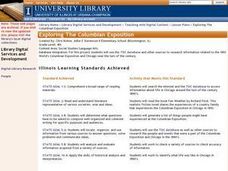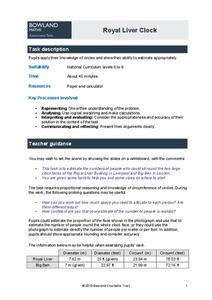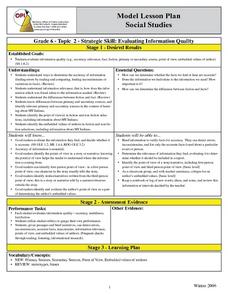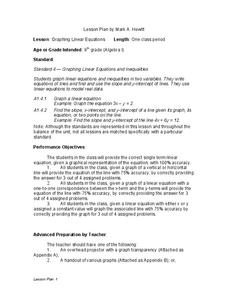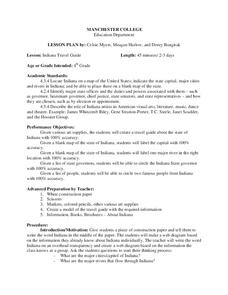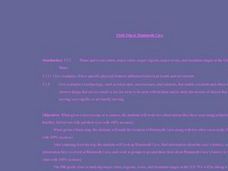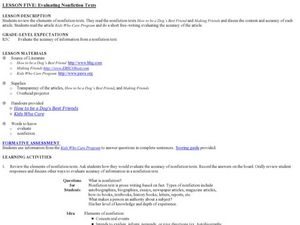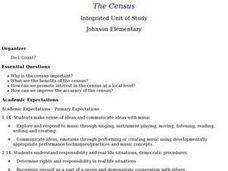Curated OER
Comma and Semicolon: Test Yourself
A pair of complex sentences, drawn from a New York Times article about a police writing class, are punctuated differently with commas and semicolons. There's only one question, but it's a good one to press your grammarians to increase...
Curated OER
Exploring The Columbian Exposition
Fourth graders listen to a read aloud of a book that provides background information on the Columbian Exposition. They research the 1893 World's Columbian Exposition and the city of Chicago at the turn of the century and create a...
Curated OER
Lessons to be Learned: The Importance of Attribution, Accuracy, and Honesty
Students investigate real world examples of media law issues. In this media law instructional activity, students read Janet Cooke’s feature and respond to the writing. Students read articles by Stephen Glass to highlight facts...
Bowland
Royal Liver Clock
Using clocks as dining tables? Scholars estimate the number of people that can sit around the face of the clock on the Royal Liver Building in Liverpool. They use estimation to justify their responses.
Curated OER
Persuasive Elements
Investigate letters to the editor and their persuasive qualities. Break your class into reading groups and give each one a different article. As they read, they complete a graphic organizer to record their thoughts and opinions. There is...
Curated OER
What's that Mammal?
Learning by example is always effective if it's paired with independent practice opportunities! Model good reading practices for your class. Learners listen to the teacher model examples of reading with voice, expression, and tone...
Curated OER
Math in English Skills II Exercise Book: Multiplication and Division
You could use this fantastic set of elementary multiplication and division worksheets in so many ways. The set is intended to support learners who require remediation or extra support in making the connection between multiplication and...
Curated OER
Day to Day Learning Guide
Fifth graders explpre the importance of carefully reading an assignment, and choosing and recording the important details so they are able to use this information for chapter study. They have a chance to check all their questions, once...
Curated OER
Evaluating Informaton Quality
Sixth graders investigate the concept of the quality of information that is used to conduct research. They begin to conceive the differences between information that is fact or fiction. Students write a critique of an information source...
Curated OER
Who Writes History?
Students examine why certain historical figures get credit for their accomplishments while others are forgotten. They read and discuss two informational handouts, discuss why people remember Columbus even if he was not the first person...
Curated OER
Determining Point of View
Students examine web sites to determine point of view and bias in information sources. They determine the usefulness of information based on these biases or limitations.
Curated OER
Yaba "Data" Cereal
Fifth graders create and modify a database using information from cereal labels.
Curated OER
What Lies Beneath the Upper Crust?
Students discover if information in an article is accurate and current. In this science lesson, students read the story carefully and decide on what the subject of the article is. Students search the Internet to see more information...
Curated OER
Fact or Fiction? Urban Legends and Misconceptions
High schoolers are introduced to a process for using web site resources to verify the accuracy of biology information. They follow a guided lesson on evaluating web sites and determining content accuracy. They select a piece of unusual...
Curated OER
Graphing Linear Equations
Ninth graders review the information that they have already learned
with regard to linear equations and graphical representations. They then assist in combining equations with a graphical element and complete various graphs with this...
Curated OER
Indiana Travel Guide
Fourth graders share their information about their home state. In this research lesson, 4th graders use graphic organizers to make a travel guide about the state of Indiana. This lesson could be modified for use with any state, it also...
Curated OER
Field Trip to Mammoth Cave
Students, when given a microscope or a camera, write two observations they have seen using technology that they did not see with just their eyes with 100% accuracy. When given a blank map, they mark the location of Mammoth Cave along...
Curated OER
Evaluating Nonfiction Texts
Students evaluate nonfiction text. In this evaluating nonfiction lesson students read two pieces of nonfiction text and respond with a short free-writing piece. Students discuss the content and focus on the accuracy.
Curated OER
The Census
Students analyze why the census is important and the benefits of it. Determine rights and responsibilities in real life situations. They are divided into groups and take a mock census of a list of teachers and students each. Results of...
Curated OER
What's Your Favorite Planet?
Fourth graders, after listing the nine planets and their differences, choose one planet as their favorite. From the information acquired on each students favorite planet, they make a graph illustrating their favorites and then transform...
Curated OER
Music Around the World: United Nations Week
Students discover the United Nations through the use of musical examples and performance. This two day lesson requires two forty-five minute sections and delivers information about different cultures around the world. Emphasis is on...
Curated OER
Immigration Research Project
Students formulate guiding questions to use as an aid for research and then use the guiding questions worksheet to help gather information necessary for meeting all criteria for completing the project. They then work together to collect...
Curated OER
You're the Expert Now
Students evaluate information about mental illness for accuracy and relevance as they examine brochures developed in the lesson by their classmates. Data about mental illness is revisited and adjusted for additional information obtained...
PBS
Interviewing a Parent
Students complete a personal interview in order to discover important information about family history and interesting family artifacts.They analyze statements from the interview in order to prove the accuracy of these statements, as...

